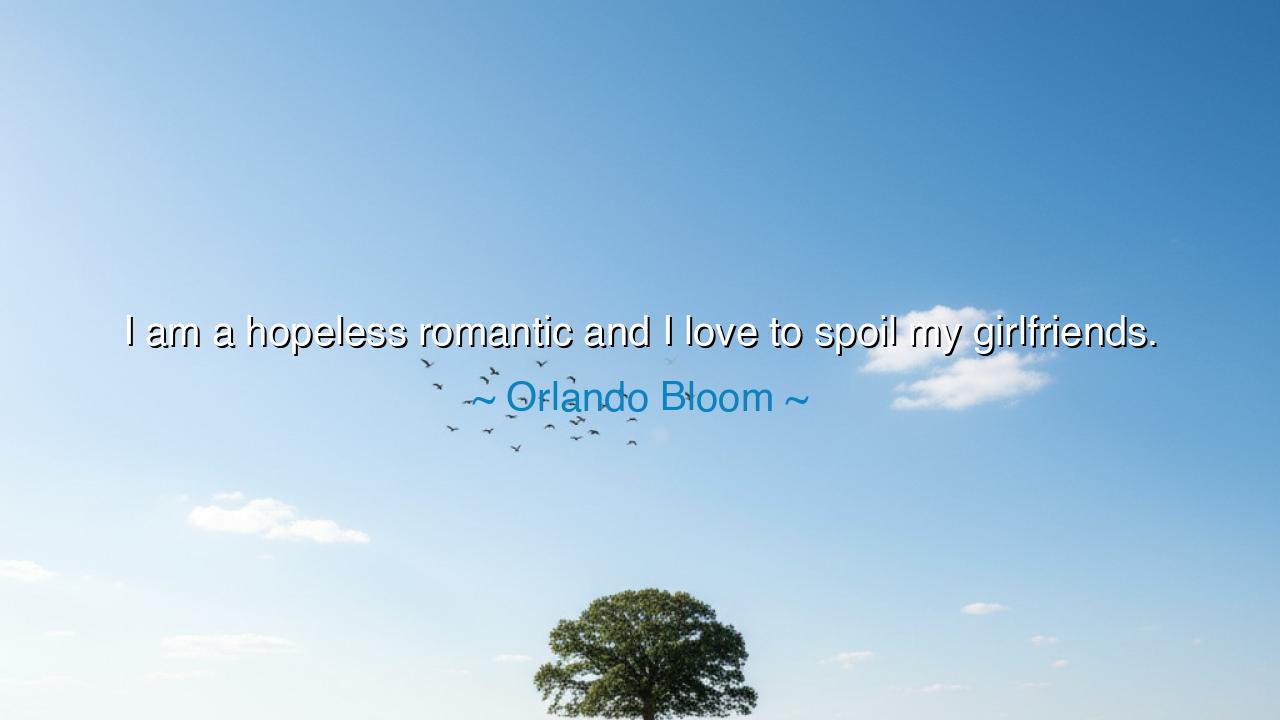
I am a hopeless romantic and I love to spoil my girlfriends.






In the words of Orlando Bloom, spoken with candor and warmth, we hear a confession of the heart: “I am a hopeless romantic and I love to spoil my girlfriends.” These words may appear simple, yet they are charged with the eternal tension between love as duty and love as delight. To be a hopeless romantic is to surrender to affection without fear of excess, to place beauty, generosity, and passion above calculation. To spoil a beloved is not to corrupt them, but to adorn them with acts of care, to remind them through gifts, gestures, and attention that they are cherished beyond measure.
The ancients revered such devotion. In Homer’s Odyssey, Odysseus longed across decades and seas to return to Penelope. His gifts to her were not jewels or trinkets, but his endurance, his struggle, his promise to one day stand again by her side. The Greeks understood that to spoil a beloved was to pour forth all one’s resources—whether of treasure, of time, or of suffering—for the sake of love. Bloom’s words echo this tradition, though in lighter form: his delight lies in showing tenderness through acts that make his beloved feel special, radiant, and secure.
To be called a hopeless romantic is sometimes considered foolish, as though to love deeply were a flaw. Yet history honors such “fools.” Consider Petrarch, who devoted his life and poetry to Laura, a woman he could not have. He showered her not with gold, but with immortal verse, raising her image into the heavens. His devotion seemed irrational, yet through it he gave the world treasures of beauty. In this, we see that the hopeless romantic is not weak, but courageous—willing to risk ridicule and rejection for the sake of expressing love fully and without restraint.
The act of spoiling in love need not be material alone. To spoil with kindness, with attention, with thoughtfulness, is far more enduring than gold. Think of Shah Jahan, who built the Taj Mahal in memory of his wife Mumtaz Mahal. No gift could be greater, and yet the gift was not mere stone—it was the declaration that love could transcend death itself. That is the extreme form of what Bloom hints at: that true love desires to give, to honor, to place the beloved above the self.
The deeper meaning of Bloom’s words is that love thrives when it is nourished. A relationship starved of gestures—whether of words, gifts, or acts of service—soon grows weary. To “spoil” is to recognize that love is a garden that must be tended, watered, and adorned if it is to remain beautiful. The hopeless romantic knows this instinctively; they understand that extravagance of the heart is not waste, but investment in joy.
The lesson is clear: do not be afraid to be lavish in love. Do not ration your affection as though it were gold locked in a chest. Give freely, not only with gifts of the hand, but with gifts of spirit—patience, kindness, delight. To spoil is to affirm, again and again, that the beloved is precious. And in so doing, you keep alive the flame of intimacy that many let fade through neglect.
Therefore, O listener, do not scoff at the hopeless romantic within you. Let it guide you to generosity, to tenderness, to expressions of love that may seem extravagant but that enrich the bond between souls. Spoil not only with objects, but with time, with attention, with devotion. For love, when nourished abundantly, grows not weaker but stronger, and through it, both giver and receiver are lifted into the fullness of life.






AAdministratorAdministrator
Welcome, honored guests. Please leave a comment, we will respond soon